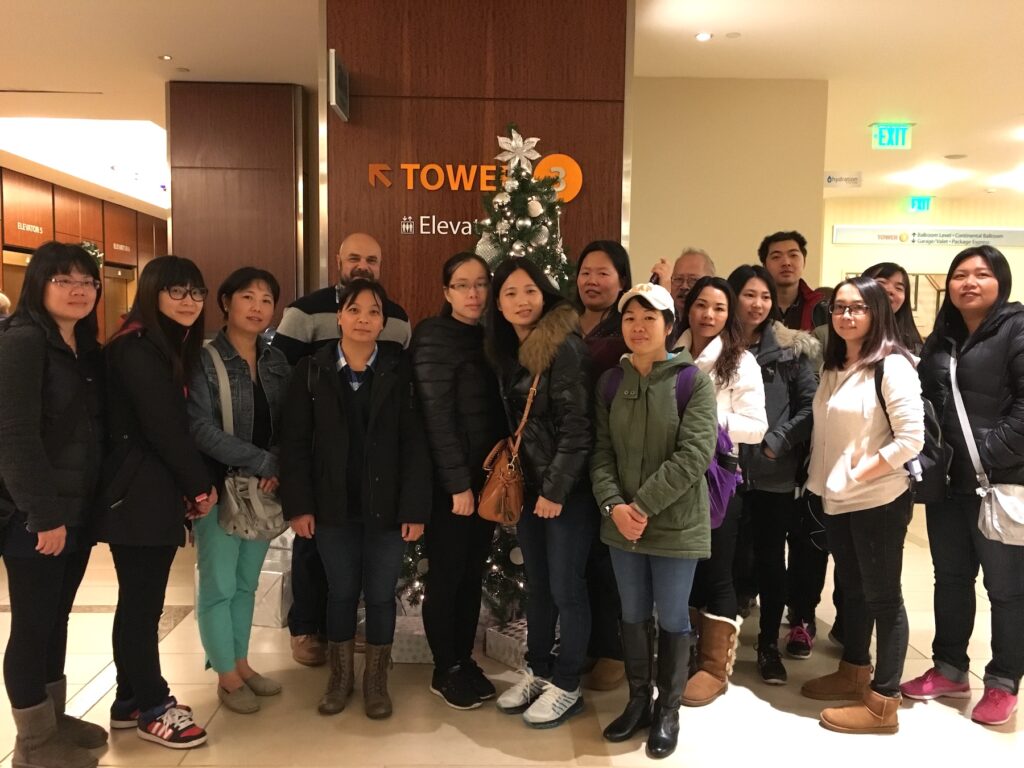
Clients in the Hospitality Vocational Training program — a collaboration between CAA, Chinese Progressive Association, and City College of San Francisco — tour a hotel to learn about the inner workings of hotel jobs.
By Socrates Li, Community Advocate, Economic Justice Team
Changes in pandemic times
I joined CAA in March 2020, right at the start of the COVID-19 pandemic. My first week on the job coincided with CAA’s first week of all-remote work. While our organization had to adapt to changes, for many of our clients, this was a time filled with uncertainty and instability. People faced mass layoffs. Our clients in the hospitality industry were hit especially hard. These stable, union jobs suddenly vanished as lockdowns and travel restrictions went into place. And while many were eligible to file for unemployment insurance, navigating the system was also challenging for our clients due to technology and language barriers.
The crisis of the pandemic and its impact on our clients’ lives shifted how we conduct our work. As everything from school to career fairs pivoted online, many of our clients were left out. I and other CAA staff helped clients navigate forms and websites, including the California Employment Development Department (EDD) website, which administers unemployment insurance. The fastest way to file an unemployment claim is online, but the application was only available in English, and it was nearly impossible to get through to the Chinese-language EDD phone lines. To help our clients and other non-English speakers, CAA successfully advocated for language access at the EDD.
We also continued to provide employment services. But even with our help, many of our clients could not accept employment at all during the pandemic. The closing of schools followed by remote learning meant that they had to stay home to care for their young children. Often, I would see a suitable job opening and contact a client about it only for them to tell me they could not work until in-person classes resumed.
A history of direct service
My work at CAA is part of a long history of CAA supporting immigrant and low-income communities through direct services. When CAA began in 1969, one of its first campaigns was to ensure that the newly opened Holiday Inn (now a Hilton Hotel) would hire local workers. This was an early example of our affirmative action work. CAA secured wins on the hiring front, and then conducted workforce services to get local community members into the jobs that we had advocated for.
My work at CAA is part of a long history of CAA supporting immigrant and low-income communities through direct services. When CAA began in 1969, one of its first campaigns was to ensure that the newly opened Holiday Inn (now a Hilton Hotel) would hire local workers.
As our workforce development program evolved, CAA partnered with the hospitality industry to place our clients in jobs with stable wages, job security, and benefits. Today, CAA is a Specialized Job Center under contract with San Francisco’s Office of Economic and Workforce Development (OEWD) to provide employment services.
Because we offer services in Chinese, we have always provided services to immigrants such as legal referrals. In 2006, our Immigrant Rights Team started offering more robust programming like our Chinese-language workshops to ensure that our community members have access to crucial immigration information. In 2021, we became DOJ recognized and accredited to provide immigration legal services. Our direct work with clients informs our advocacy agenda, which includes upholding sanctuary protections, advocating for non-citizen voting on school board elections, and championing language access.
CAA’s economic justice work today
Today, more than ever, our clients seek employment that is stable and offers healthcare benefits. Jobs in the public sector or in hospitality, healthcare, and education facilities are especially attractive. Because many of our clients have low English proficiency, they seek out positions where the language barrier may not be a problem, such as housekeeper, custodian, and food service worker.
We also help our clients seek out education to open them to more employment opportunities. They may get additional credentials to become eligible for custodial and childcare work, or take ESL classes in order to improve their English.
One of our clients did just that. She has worked informally in child care for families and also as a server in a restaurant. Over the years, she took courses at City College of San Francisco to obtain an Associate Teacher certificate. That helped her land a better job at a large child care center. Her story is just one of many. Each year, CAA serves 120 to 140 clients through our Economic Justice program. Through sustainable employment and economic opportunities, we can help our community grow stronger.



